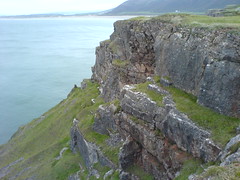30 September 2005
You MUST Go See Serenity!
29 September 2005
Joining the Existential Fray
At any rate, they've been talking about striving and ambition, and finding a way to live in the moment at hand rather than disrupting that moment with longings and frustration. In Heideggerian terms, it's all about recognizing one's thrownness into Being, rather than struggling against it, thereby producing fallenness. Dasein (us) is that creature for which Being is at issue. The posts referenced above prove that for sure.
I want to add a new wrinkle: what to do when you find yourself on the precipice of fallenness precisely because life seems so good? You start to worry about when the bubble will burst, about what darkness lies round the corner, all because things seem a bit too good to be true. I've been doing this over the past week or so: becoming strangely paranoid and freakishly worried, all because I seem to really, really like the place I live, my new job, and my new colleagues. Plus, folks seem to appreciate me around here, and what could be more suspicious than that? My 'authentic Being' seems to consist of living with a chip on my shoulder, and they are trying to take that away from me!
narrative and blogging
28 September 2005
Apple Loses (sort of)
To be clear, these are two distinct technologies. .Mac does many things very well - 1 gig of storage space (used to communicate with students), spam free email, free goodies, and a great way to build simple websites. But Flickr's genius is that it doesn't require you to build a website (even one it builds for you) in order to share images. With .mac I can export directly from iPhoto (great!), but I still have to go back and edit my homepage to include the new photo page I've made. With Flickr I can also export from iPhoto (thanks to some guy who wrote the plug-in...really, thanks!), but then I can follow the link to my Flickr site, and then click 'blog it!' and be done! That's what I'm doing now, and it's brilliant!
By the way, all the photos were taken with my new phone. This post was going to be about that (I'll blog it later), but I found myself more interested in the question of how to disseminate the photos I was going to talk about, than talking about them.
EDIT: The drawback to Flickr is that since it's Rebecca's account, it tells Blogger I'm Rebecca. Post above is by Sam, just so you know - not that authorial intention matters....
Slice of Life: Kitchen
momentarily or for a moment
It's not having what you want, it's wanting what you've got. or something.
I think it's good that we want more than we have, that we're striving for something most of the time, whether that's staying above water this week, making sure your kid grows up right, or becoming a rock star. Ambition, in its weakest form, is still a good motivator. So I'm pro-ambition.
But as someone mentioned to me the other day, southern Wales is the sort of place where ambition comes to die. And she meant it in a positive way. It's beautiful here (wait for posts during February to switch that around), the people are overwhelmingly nice, everything is at your fingertips, from fresh eggs to bus service to the beach to all of the UK and Europe one plane hop away. And people on the bus have conversations about how they really don't want to work more than three days a week, I mean that's really the limit, isn't it? Oh yes, they say, no more than three days, and even then...
And as someone who has bucked the inertia of a tenure track job (some might say quit a perfectly good, permanent position) I am loathe to enter into another inertia-laden situation. But I think inertia and the death of (or lessened) ambition are two different things. I think low levels of ambition still can allow you to thrive in a comfortable location.
I suppose this is the moment in our lives, post-20s, pre-midlife crisis, the "thirtysomething" years, if you will, that cause one to wonder what one was striving for all those years, and whether that's really what you want. and then, realizing it's not, what to replace it with? Certainly the amazon/acupuncture path has nothing normal about it, and nor does the leaving (two) tenure track jobs path.
and if it takes a lot of thought, care, and words to figure this out, then perhaps that is the shortest route to a balanced path, and perhaps we're just, momentarily, again assessing our lives before we once again plunge into them. We're just a bit more careful about the location of the plunge now then we were in our Salad Days.
25 September 2005
the Wurm
and no we did not go out on the Wurm, although the kids were up for it... next time.
24 September 2005
contraception. for free.
but it's revolutionary nonetheless, because free birth control means it's free. you need only go to a doctor (also free and freely available—I made an appointment one week in advance and waited only 15 minutes for the appointment once I arrived. I paid nothing to see the doctor.) I imagine that in major urban areas where the population density is higher and there are fewer doctors this would not be the case (in terms of the waiting and the ease of appointment) but the free part, at least to see the doc, would be the same. and he told me to see the chemist at the pharmacy. which pharmacy? I ask, thinking there will be some sort of limit on where I can go, who I can see, etc. Well, perhaps there is a limit, if you consider that he told me to go to the closest pharmacy to my home, two blocks down the road. I didn't get the sense that I was required to go there, though, just that he chose that one for convenience.
so then I thought that perhaps there were limits on who could get this free contraception in terms of age-limits. so I did some digging (not a lot, mind you) and found this patient information site that involved an argument about how best to make sure that teens came in to get the contraceptives so that they wouldn't get pregnant. Here's the advice they were giving to GPs:
Under 16s Guidance from BMA and others states that 'the duty of confidentiality owed to a person under 16 is as great as that owed to any other person'.
However, there is complete right of confidentiality where issues such as abuse and child protection are involved. Guidance also states that 'any competent young person, regardless of age, can independently seek medical advice and give valid consent to treatment'. Following the Gillick case the Department of Health issued the following guidance on providing contraceptive advice and treatment to young people under the age of 16: A doctor needs to be satisfied that:(Dept. of Health 1986 guidance on the provision of contraceptive advice to young people under 16 years old)
- That the young person could understand his advice and have sufficient maturity to understand what was involved in terms of the moral, social and emotional implications.
- That he could neither persuade the young person to inform the parents, nor to allow him to inform them, that contraceptive advice was being sought.
- That the young person would be very likely to begin, or to continue, having sexual intercourse with or without contraceptive treatment.
- That without contraceptive advice or treatment, the young person's physical or mental health or both would be likely to suffer.
- That the young person's best interests required him to give contraceptive advice or treatment or both without parental consent.
wow. it had always seemed silly to me that in the US the debate was over abstinence and forcing kids not to have sex, when what it should be about is making sure that stupid acts, like those we all did as teens, don't end up utterly changing your life, taking choices away from you, putting you in situations that you aren't prepared for. and teens do stupid things. and when we don't give them any respect in their own choices as they begin to make them, when we take away their ability to choose something smart, that just seems societally irresponsible, nigh suicidal.
of course, the free health care thing means this is possible in the UK and not in the US. but it doesn't have to be that way. we could at least allow greater access for those under 18 to get contraception, for free. because there's always trouble when the unwanted child comes along and you have to drive four states over to get the abortion, which you waited too long to get anyway (out of shame and you're supposed to abstain, right?) and you don't have the money for it (raising the child or getting rid of it) and now forget college, forget pulling yourself up out of poverty. you've been ignored and forgotten.
revolutionary. that's all I'm saying.
23 September 2005
old things: Swansea castle
straight on to the right is one of the major bar-hopping streets of Swansea. the founding Normans would be proud.
on unemployment
but, as I discover now, inevitable cycles rarely exist. perhaps the Vedic yuga cycles of 40,000 years might be considered inevitable, but even they run into bumps in the road. perhaps Shiva won't, in fact, burn the universe to a crisp in the ultimate cleansing ritual this time. or perhaps he will, but not until week after next. (yes, I've read too much Rushdie. shoot me.)
and so last spring (ironic in its seasonal rebirthing symbolism) I went through the hazing ritual known as the job market yet again, for the seventh time in eight years. granted, some of those years I applied for only one or two jobs. but five of them were more or less all-out job search years. and this time I received a whopping 6 interviews (that's batting more than .500, by the way) on-campus. and looking back now on those interviews, it feels like I was trying to make myself fit them (something one often does in interviews) by making myself smaller. hunching over a bit. breaking a few bones in my feet to make them look like a size 8. that sort of thing. metaphorically, of course. and it didn't work. they saw through me. saw that I finished a book last year. that Duke Univeristy Press is interested in it. that I am about to publish the only ever reader in Asian art history. that I am well-published in scholarly journals. that I am a great teacher. and so they did not hire me. some did not hire anyone at all. most hired newly minted PhDs who are probably very smart and very promising.
and so this autumn (one doesn't use the word "fall" for seasons in the UK) I am looking for a job again. but it seems that something has changed. I'm no longer on an unpaid sabbatical. this state of non-job, pick-up job, seeking job is now a part of my life. and I'm not looking for a job (well, of course I am, but...*) in the sense that I'm not assuming some sort of inevitable yearly cycle of job ads, job applications, job interviews, job offers (or not). I'm looking for a way of being an academic, an intellectual in this world. a way that perhaps makes use of some of the things I've learned and some of the things I've learned how to do. I suppose everyone, in every field, might go through something similar at one point or another. I've done the traditional track (first comes PhD, then comes tenure track job, then comes tenure and...) and so now I'm looking for the other thing. or things. I'll let you know what form it takes when I get there. or perhaps, more properly, as I'm navigating along.
---
*if you are reading this and happen to have a full-time post at a university or similar doing something that might use Asian art history, and you happen to have such a post in well, the greater southern Wales region, please give me a call.
21 September 2005
Serenity 2005. again
- Sarah Paulson of Deadwood fame (she plays Miss Isringhausen) has a small part in Serenity, which is very cool.
- Joss has been stolen from already—Firefly's use of the quick zoom, acknowledgement that space is, well, very quiet: silent, if you will, and his playful use of language have been seen on other (later) shows, such as Battlestar Gallactica (the new one), where the quick zoom and the quiet space take center stage, and Deadwood, of course, where cursing mingles with a rhythm of language that is, well, lyrical.
- Joss
steals frompays homage to several sci fi and western directors over the course of the film, which is very fun.
Serenity!
As some of you out there know, I positively hate trailers that tell you what happened in the movie and I can't stand spoilers, so much so that I don't even read reviews. So it's hypocrtical of me to write a review before any of you have seen it. Thus, I'll just say this:
- It's brilliant.
- The jump to the big screen goes quite smoothly.
- If you're a Joss fan, it's great.
- If you've never seen Firefly, it's great.
- It has some turns in it you won't expect.
19 September 2005
boot sale
- dish towels, £1 pack
- matching coffee and tea canisters (very 70s, in coffee color of course), £2 the set
- new flat head and philips screwdrivers, £1 each
- two translucent glasses with Buffy and Angel silkscreened onto them, priceless (okay 40p, but who's counting?)
16 September 2005
the Worm
To be cut off on the Worm either means twelve hours of boredom or else a brief but exciting ride in an RAF helicopter - an experience not worth the embarrassment.
as the daughter of a geologist, I of course purposively know nothing about geology, having scorned any proffered knowledge for most of my childhood living in the Rocky Mountains. and as we are planning to take a little day trip out onto the Gower Peninsula (which Swansea is on) to check out the beaches (not, I'm guessing, in any way similar to beaches on The O.C.), I did some web surfing to find out where to go and what to see. and I ran across the Geological Society site on Gower and its geology. it's a self-guided course on geology based entirely on the Gower peninsula!! imagine my excitement! (actually the maps are pretty cool, and I like how you are given direction based on rock formations, not roads or signage....)
and so we are off to Rhosili, the last place covered in the cumulative course, as, of course, jumping to the end of the instructions is also a trait I picked up from my father, where we hope not to be cut off on the Worm.
15 September 2005
cities and rebuilding
this post was spurred by Greg's post on NO and the future rebuilding efforts one hopes might actually occur. they didn't for DC, the nation's capital, but perhaps NO will face a brighter future than that. I was trying to think about tenets for (re)building a city; what you need in order to prepare the soil for some good organic growth. infrastructure for one, hopefully public transportation that encourages people out of their cars and into human interaction (sorry Corbusier). and easy access to food through smaller, local markets rather than the massive box stores on the edge of town. and places to walk. places to ease the city-ness of the city, like central park in Manhattan. should it be a garden city, like the town I was born in, designed from the ground up? or a cardo-and-decumanus grid city, on the grounds that hey, if it worked for the Greeks and Romans, it's good enough for us. or perhaps we should go back to local, vernacular forms of building, attempting in part to respect the landscape and its history. or take a page from Amsterdam's book and perhaps acknowledge that what we're doing by living in NO is ridiculous and hubristic but historically important and thus we must fund the effort to hold back the water and hold up the land.
all of this reminded me of a review of a book on cities that recently came across my e-mail in-box, about resilient cities. the reviewer has one major and interesting critique of the book, the kind of critique that can only arise out of a good book, mind you, so this isn't damning the book. Andrew Herscher, the author of the review points out that the book's focus is sudden, burst-like disasters that effect cities and their responses to them. he suggests that one of the problamatic things the book (and I think by extension our understanding of Katrina and other disasters in our future) assumes is that there is such a thing as a normal working of a city, a status quo, interrupted by disasters, and so the book's project is to see how resilient cities are to these interruptions.
but, as Herscher would no doubt point out, what we're seeing in NO is that in fact this city has been in perma-disaster, much like DC, much like Mumbai, for a very long time. disaster involving socio-economic inequality, racial inequality, infrastructural neglect, and all the rest. a city that's not resilient but in "terminal urban disaster." Much like many cities in the so-called third world, the lesson of NO is at least in part that we can't pretend things are working when they're not. we can't wait for a disaster to kill thousands of people and wipe out an entire city to begin to try to fix things. and frankly, we can't merely mount a critique of the president for his handling of this Katrina disaster. it should be more along the lines of the government's understanding of the socio-economic picture of the entire south—the US south and the global south. as Cornell West wrote a few days ago, we need a marshall plan for the south and we need it now.
the barista
14 September 2005
Of Teaching Hours
Over the last week I've learned more about the British Higher Education 'system' than months of previous study. Unlike the US, there is no 'standard teaching load' here. Instead, what is standardised (at least within departments at particular institutions) is teaching hours. On my first utterly jetlagged day in the department, my HoD (that's Head of Department - there are no chairs) gave me the rundown on teaching expectations, and he did so solely in terms of total number of hours.
I wanted to try to put those numbers in perspective, by first presenting a very brief history of my 'total hours taught' at prior institutions. So here goes...
Note 1: teaching 'hours' here, I've found, are rounded up from 50 minute lectures and tutorials, so I've 'rounded up' similarly for US institutions. Thus, 50 minutes = 1 hour here, so 50 minute class periods in the US = 1 hour; 80 minute class periods = 1.5 hours; and 110 minute class periods = 2 hours.
Note 2: this does take ANY account at all of admin work, out-of-class student contact, etc.
- small public liberal arts college, 12 hours per week for 30 weeks = 360 hours
- small private liberal arts college, 9 hours per week for 28 weeks = 225 hours
- large US research university, 6 hours per week for 30 weeks = 180 hours
- UK University, maximum number = 140 hours
Now, what I'm almost too embarassed to even admit is that after explaining that 140 was the maximum (and normal) number of hours for members of staff, he then went on to stress that that was far too many hours for me to undertake in my first year. Thus, I'm teaching significantly less than that this year (and I am too embarrassed to give you the actual number).
I'll withhold commentary, except to mention how much difference is elided in the US, precisely because teaching hours are never mentioned. Let me put it starkly: in the US system, institution #1 and institution #2 have precisely the same amount of teaching, i.e. 'a 3/3 load'.
13 September 2005
week one
now that we have internet and aren't relying on our neighbors—
[total aside: for the last week our lives were ruled by the little ice cream cone that is the airport icon at the top of the screen. it seems our neighbors, lovely tho they are for having an unprotected network, turn off (!!!the horrors!!!) their computer, including wireless router, when they are not using it. thus Sam and I have been running around the rather huge flat shouting "internet! it's up! internet!" whenever the cone turns black, probably to the amusement of our neighbors, who were likely playing with us the whole time. we are, by the way, known as the "americans next door" just fyi.]we are back in the loop, so to speak, and are coming up for air on the whole Katrina disaster. Apologies for being late to the bandwagon, but it must be said again.
the stories of blatant racism, protection of corporate property (Wal-Mart, Walgreens, various grocers) and private property (the entire West End of the city, where the wealthy folks live) over the protection of the lives of those trapped (quite literally) in the city is astonishing. The mismanagement and ludicrousness of "praise" given by Bush to the homeland security chief is par for the course, the surprise is that he resigned, instead of receiving the traditional administration promotion. As usual, I find Jon Stewart to be the best for summing it up.
12 September 2005
07 September 2005
normal & faucets
for example, our flat (or our "tall" if you're being physically accurate), has all of the hot water on the right and the cold on the left. at first, I thought perhaps I had forgotten (I'm not so good at right/left in the best of circumstances) which location they were in the last time I was in the UK. but then I started thinking, no—this must be normal, or perhaps it's a wales thing. And then, when I tried to take a shower this morning I realized that no, in fact, cold on the right is "normal" even in wales. For, unlike all the other taps in the flat (okay, there are only two sinks total and the bathtub, so three others), the shower indicator is a single unit, indicating that cold is to the right and hot to the left. the thing is, not so much in this house. I discovered this after about 5 minutes of waiting for the hot to kick in (is it normal to wait this long for hot water? I thought. maybe there's something strange about that seemingly small box water heater with impenetrable switches in the kitchen? yikes, toes getting cold...) and then it hit me. hot to the right. worked like a charm. so the house is weird, and/or we've identified what "normal" is: creative plumbing.
06 September 2005
We're Here!
in wales/cymru
03 September 2005
images of/and death/disaster
But as you know, and as ockham's razor has noted, the last few days have been all about New Orleans and the Gulf Coast, and for good reason. as an art historian type, I'm always interested in the images; I had a former student who did a project on the photos of the first gulf war, and the way we were shielded from images of the brutality of war and death.
so I've been watching with some interest the images out of NO and comparing them to other disasters (not so natural) that have also caused massive destruction and death, and to which the NO situation has been compared in the text of the news: Iraq. a national guardsman in NO told the news that it was better in Iraq, because despite the constant threat of death, at least you knew you were getting three meals a day, there was a plan, and some semblance of organization.
in the washington post yesterday they included pictures of an old man in a lawnchair, slumped over, and the caption identifies him as deceased, as others mill around him near the superdome. it struck me that we are seeing more images of death from NO and the gulf than we have for the entirety of our war in Iraq or Afghanistan. It's horrible what's happening in NO. and I'm extremely angry at the hubris and arrogance of a national administration that ignores warnings from experts to fix the levees, fires those experts, and then squabbles over whether sending the military in is legal. oh, and continues to stay on vacation for two days after the storm hits.
but the picture of the massive pile of shoes (see #14 in the slideshow) on the bridge in Baghdad on wednesday in the aftermath of the stampede set off by rumors of a suicide bomber is just as horrifying to me. almost 1000 dead there. jumping off the bridge into the Tigris to their deaths, some at the end of the bridge jumping onto the concrete. and the death toll there will rise in Iraq just as surely as it will in NO. for me, despite all the very real differences between the two situations, both images strike me as icons of mismanagement at our highest governmental level. and when I say "our" I mean the U.S., our elected officials and those whom they appoint to run things.
02 September 2005
Basawan is a genius
And Mughal painting is amazing. It's not my field at all, but I just love looking at these works. They are painstakingly painted, beautiful, and layered with meaning. The feats of the artists are just unparalleled. Okay, maybe Persian painting, and a few others. I might give you Caravaggio. Or more parallel, van Eyck. But still. This is amazing stuff. Basawan, one of the top artists of the court, just cannot be matched. the link above gives you the barest sense of my favorite painting in the exhibition. the horse in the bottom right corner is absolutely astounding, the vegetation above the cave is amazing. and the figures are just fantastic.
moral of the story: go see Mughal painting when you can. Many museums have at least one example, but the best are the Met in New York (where this image is), the Boston Museum of Fine Arts, and several museums in the UK.






